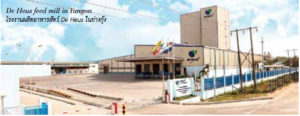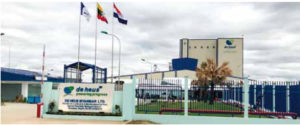De Heus Myanmar targets doubling its annual output to over 200,000 tonnes with the commissioning of a new feed mill in Mandalay in Q2, 2018, according to Johan van den Ban, managing director.

Johan van den Ban
De Heus wants to become a long-term preferred partner of independent livestock farmers in the country. It is pursuing this strategy by identifying needs and sharing knowledge with producers.
“We have never invested in commercial livestock farming. Our concept is to work with producers, not compete with them. We help them to improve quality and performance through training. We regularly invite experts to train our clients,” said Mr van den Ban.
The company operates its own extension service of veterinary specialists who visit farms all over the country every day.
At present, poultry feed – broiler, layer, meat-type duck and quail – accounts for around 75% of annual turnover, with 25% cattle and hog.
Currently ranked as the 3rd largest feed producer in Myanmar, De Heus targets becoming the 2nd largest feed producer in the country by 2018.
Demand-driven activities
Myanmar is a net importer of poultry genetics while Malaysia and Thailand are primary suppliers.
Seeing that local poultry producers are in need of good quality and consistent supply, De Heus has joined forces with Belgium’s Belgabroed to invest in a hatchery to produce 1.7 million day-old chicks/month.
Bel Ga Myanmar Ltd, the recently formed subsidiary, is 100% owned by BDH Azie BV, a joint venture between Belgabroed and De Heus. The project worth US$ 1.5 million aims to support independent broiler producers, and 3 poultry training centres are established along with it. Myanmar’s domestic poultry industry is likely to sustain growth of around 15% per annum.
De Heus has agreed to supply live birds produced by De Heus growers to its poultry processor alliance in Yangon, which currently processes 2,000 birds/hour. The poultry meat will be delivered via cold chain to supermarkets and food service clients.
Feed quality and safety
From just 17,000 tonnes in 2015, De Heus’s goal is to hit 200,000 tonnes in 2018 and 300,000 tonnes in 2020. This will make it the most dynamic feed company in Myanmar, said Mr van den Ban.
 Its facility in Yangon is running at 80% capacity. The 40 tonnes/hour plant is operated two shifts/day, seven days a week.
Its facility in Yangon is running at 80% capacity. The 40 tonnes/hour plant is operated two shifts/day, seven days a week.
New products, better technical competency and marketing for ruminants will boost demand for its products. It is estimated that the annual feed supply in Myanmar is around two to three million tonnes.
De Heus has been ISO 22000, and HACCP accredited.
The feed is manufactured in Myaung Dagar, Hmawbi Township, 50 km northwest of Yangon and sent to four distribution hubs located in Mandalay, Nattalin, Thatone and Taung Gyi.
Quality control
Myanmar has abundant corn, with an annual harvest of around 2-2.5 million tonnes/year. Some 50% of the harvest is exported to Southern China. Corn is mostly used by home mixers.
Myanmar is by far the world’s largest producer of sesame oil. But oilseed cake – a coproduct derived from vegetable oil extraction – especially those containing sesame, palm kernel meal and ground- nut cake are often contaminated with mycotoxins.
In Myanmar, as in other countries, mycotoxins are commonly detected in imported soybean meal, DDGS, palm kernel meal, corn gluten and more. De Heus has a QC lab capable of assaying mycotoxins and proximate analysis.
The Myanmar authorities have not issued any regulatory framework to control anti-microbial inclusion in feed, but De Heus has taken proactive steps to help prevent antimicrobial resistance.
The company’s policy allows for prudent use of antimicrobials, especially in young animal feed, but no antimicrobials or antibiotic growth promoters in nishing feed, he said.
The company, whose goal is to provide feed for all species, started business in 2014 by importing feed from Vietnam. Later in 2016, it built a plant locally and ramped up production until it reached sufficient volume to eliminate the need for imports in Q4, 2016.
 The 2nd mill in Myotha Industrial Park, Mandalay, worth around US$16 million with 40 tonnes/hour capacity, will hone cost competitiveness and reduce lead time in delivering products to customers in the upper part of the country.
The 2nd mill in Myotha Industrial Park, Mandalay, worth around US$16 million with 40 tonnes/hour capacity, will hone cost competitiveness and reduce lead time in delivering products to customers in the upper part of the country.
De Heus currently operates in Vietnam and Myanmar.
In India, it is renting a feed mill in Gujarat, India’s westernmost state. It is keen to enter other fast-growing markets in the region including the Philippines, Bangladesh, Cambodia and Indonesia.
De Heus supplies around seven million tonnes of feed annually to customers around the world.
